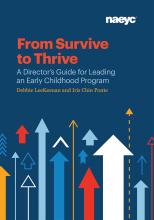From Survive to Thrive: A Director’s Guide for Leading an Early Childhood Program

About the Book
With so many demands and limited time, being an early childhood program leader is more challenging than it’s ever been. This guide, grounded in current research and based on the experiences of the authors as well as directors from across the country, blends theory with practical tips you can implement immediately. Each chapter provides the building blocks you need to
- Develop effective policies and procedures
- Manage a healthy budget
- Build a strong staff
- Forge robust home–school partnerships
- Handle confrontation and conflict
- Achieve and maintain full enrollment
Plus, each chapter recommends additional resources you can explore to take your knowledge and professional development to the next level. Use the guidance and strategies contained in this book to go from surviving in your role as director to thriving in it.
Table of Contents
This section includes sample content from inside the book (PDF).
- Preface
-
Chapter 1: What Does It Mean to Be a Director?
- The Director as Both Manager and Leader
-
Know Yourself
- Recognizing Your Personal Attributes
- Identifying Your Leadership Traits
- Practice Facilitative Leadership
- Treat Teachers the Same Way You Expect Teachers to Treat Children
- Give Yourself the Permission to Lead
- Recognize What You Really Have Control Over
-
Chapter 2: Program Context and Culture
-
Reading and Understanding the Context of Your Program
- Gather Information
- Analyze the Information
- Set Program Goals and Develop an Action Plan
-
Creating and Cultivating the Culture of Your Program
- Strong Relationships
- Meaningful and Effective Communication
- A Welcoming Environment
- Risk Taking, Reflection, and Growth
-
Reading and Understanding the Context of Your Program
-
Chapter 3: Achieving and Maintaining Program Quality
-
Developing Policies and Procedures
- Vision and Mission Statements
- Organizational Chart
- Safety Procedures
- Identifying and Reporting Suspected Child Neglect and Abuse
- Guidance and Discipline
-
Licensing Basics
- Physical Space
- Staff Education and Training Requirements
- Health
- The Licensing Process
- Accreditation
- Quality Rating Improvement Systems
- The Flow of the Year: A Director’s Big-Picture To-Do List
-
Developing Policies and Procedures
-
Chapter 4: Budget and Finances
-
Basic Budgeting Concepts
- Identifying Revenue and Expenses
- Developing Financial Policies and Procedures
- Selecting a Financial Management System
-
Tips and Strategies for Preparing an Effective Budget
- Be Transparent and Assume Accountability
- Allow for Autonomy
- Be Strategic
- Be Flexible
-
Help! What Do I Do When My Budget Isn’t Working?
- Step 1: Find Out What’s Wrong
- Step 2: Reduce Your Expenses
- Step 3: Speed the Inflow of Revenue
- Step 4: Explore New Income Sources
- Keys to Successful Fundraising
-
Basic Budgeting Concepts
-
Chapter 5: Program Curriculum
- How Do You Decide the Best Curriculum Approach or Model for Your Program?
-
Curriculum Approaches
- Packaged Curricula
- Play-Based Learning
- Emergent Curriculum
- Project-Based Learning
- Integrating Best Practices and Early Learning Standards
- Supporting Your Teachers in Implementing Curriculum
- When the Curriculum in Your Program Is Not Working
- How Do Teachers Document Their Implementation of the Curriculum?
- Ongoing Maintenance of a High-Quality Curriculum
-
Chapter 6: Observation, Assessment, and Documentation
-
Observation and Assessment
- Program Assessment
- How Am I Doing? Evaluating the Director
- Assessing What Children Are Learning
-
What Is Documentation?
- Moving Toward a Culture of Documentation
- Practical Tips for Facilitating Documentation
-
Observation and Assessment
-
Chapter 7: Staffing
- Staffing Models and Scheduling
-
Hiring Great Teachers
- Consider the Qualifications and Qualities You Need and Want
- Advertising for Applicants
- Interviewing Candidates
- Retaining Great Teachers
- Communicating with Staff
- Teacher Observation and Evaluation
- Supervising Teachers
- Staff Meetings
-
Supporting Your Staff’s Professional Development
- Goal Setting to Empower Teachers
- Ideas for Effective Professional Development
- Managing Confrontations, Conflicts, and Challenges with Staff Members
- Staff Dismissals: Having to Let Someone Go
-
Chapter 8: Working with Families
- The Family’s Role in Children’s Learning and Development
- The Director’s Role in the Home–School Partnership
- The Teacher’s Role in the Home–School Partnership
- Funds of Knowledge Approach
- Welcoming Families to Your Program
- Communicating with Families About the Program
-
Communicating with Families About Individual Learners
- Using Technology to Communicate with Families
-
Family Engagement
- Family Goals Sheet
- Home Visits and Visits Outside of the Center
- Family Meetings and Conferences
- Building Community Through Family Events
-
Managing Confrontations, Conflicts, and Challenges with Families
- Conflict Between Program Staff and Families
- Conflict Between Family Members in the Context of the Program
-
Chapter 9: Center Enrollment
-
Marketing, Advertising, and Recruiting
- Market Research
- Be Clear About Your Program’s Mission, Philosophy, and Services
- Marketing Tools and Avenues
-
Application and Admissions Process
- Application Materials
- Family Interviews
- Admissions and Selection
- Notification of Acceptance and Intake Forms
-
Marketing, Advertising, and Recruiting
-
Conclusion: Balancing Act—Managing Your Role as the Director
- Principle 1: Manage Your Time . . . and Appreciate Its Returns
- Principle 2: Learn to Let Go
- Principle 3: Exercise “Rotated Neglect”
- Principle 4: Make Time for Self-Care
- Principle 5: Be a Lifelong Learner
- Principle 6: Network
- Principle 7: Be an Intentional Decision Maker
- References
- Acknowledgments
- About the Authors
Book Details
ISBN: 978-1-938113-36-9
Publish Date: 2018
Related Resources
Online Articles
Leadership Teams: Working With Consultants to Support Meaningful Change - This article describes ways to select and use consultants as valuable members of the leadership team. (Young Children, March 2015)
Reconciling Leadership and Partnership: Strategies to Empower Professionals and Families - In their work with families, early childhood professionals often find themselves challenged by the need to be both leaders and partners. (Young Children, May 2015)
Expanding the Lens—Leadership as an Organizational Asset - This article presents a framework for thinking about the many ways early childhood administrators influence the quality of their programs, and then looks more broadly at the concept of distributed leadership in an organization. (Young Children, May 2015)
Looking for more resources on Leadership? Visit our topic page to browse our collection of articles on the topic.
Debbie LeeKeenan, MEd, is an early childhood consultant and lecturer (www.antibiasleadersece.com) in Seattle, Washington. Debbie has been an educator for over 45 years and worked with Carolyn Edwards at the University of Massachusetts Lab School from 1986–1993. She was also a long-time director/lecturer at the Eliot-Pearson Children’s School at Tufts University. [email protected]

Iris Chin Ponte, PhD, is director and classroom teacher at the Henry Frost Children’s Program in Belmont, MA. She is an adjunct faculty member in the Graduate School of Education at Lesley University. Recognized as an Exchange Emerging Leader in 2015, Iris is a former Fulbright Scholar, with expertise in cross-cultural issues in education in the United States, the United Kingdom, Taiwan, China, Japan, and Newfoundland. She worked for Sesame Street Research at the Children’s Television Workshop in New York and has published in the areas of children and technology, behavior management, children’s play, outdoor environmental design, early education program leadership and birth parent reunions and heritage trips for adoptees in China. Dr. Ponte has received professional recognition from the Children’s Defense Fund, CBS, and the American Educational Research Association and was awarded the Thomas J. Watson IBM Fellowship.
Reviews
Not since Paula Jorde Bloom’s work on quality leadership for directors have I seen a resource so thorough. From Survive to Thrive is an essential guide for any current or aspiring director to use in actively preparing for and successfully navigating the many aspects of leadership in early childhood education. College professors teaching ECE administration will find this an invaluable book for teaching others how to become effective leaders.
—Linda S. Anderson, Adjunct Professor, Aurora University and Rasmussen College
This accessible book provides early childhood program leaders with a helpful structure for their complex roles and a valuable array of resources to make intentional, thoughtful decisions every day.
—Robyn Brookshire, Director, Early Learning Center for Research and Practice, University of Tennessee, Knoxville
LeeKeenan and Ponte remind early childhood education leaders that we have the best job in the world! We are engineers, conductors, participants in play. We can ignite imaginations one minute, then wipe children’s tears and guide the growth of teachers in the next. The authors examine true-to-life program scenarios in concrete, intentional ways and provide tips and ideas that are helpful for all directors. As a 45-year veteran director, I recommend this book to any early childhood leader who seeks to thrive at this job.
—Johanna Booth-Miner, Director and Owner, Live & Learn Early Learning Center
A much-needed book for anyone taking on the job of directing an early childhood program. With its comprehensive, detailed discussion of the many facets of this position, this resource will find a special place on all new directors’ desks.
—David Elkind, Professor Emeritus of Child Development, Tufts University
